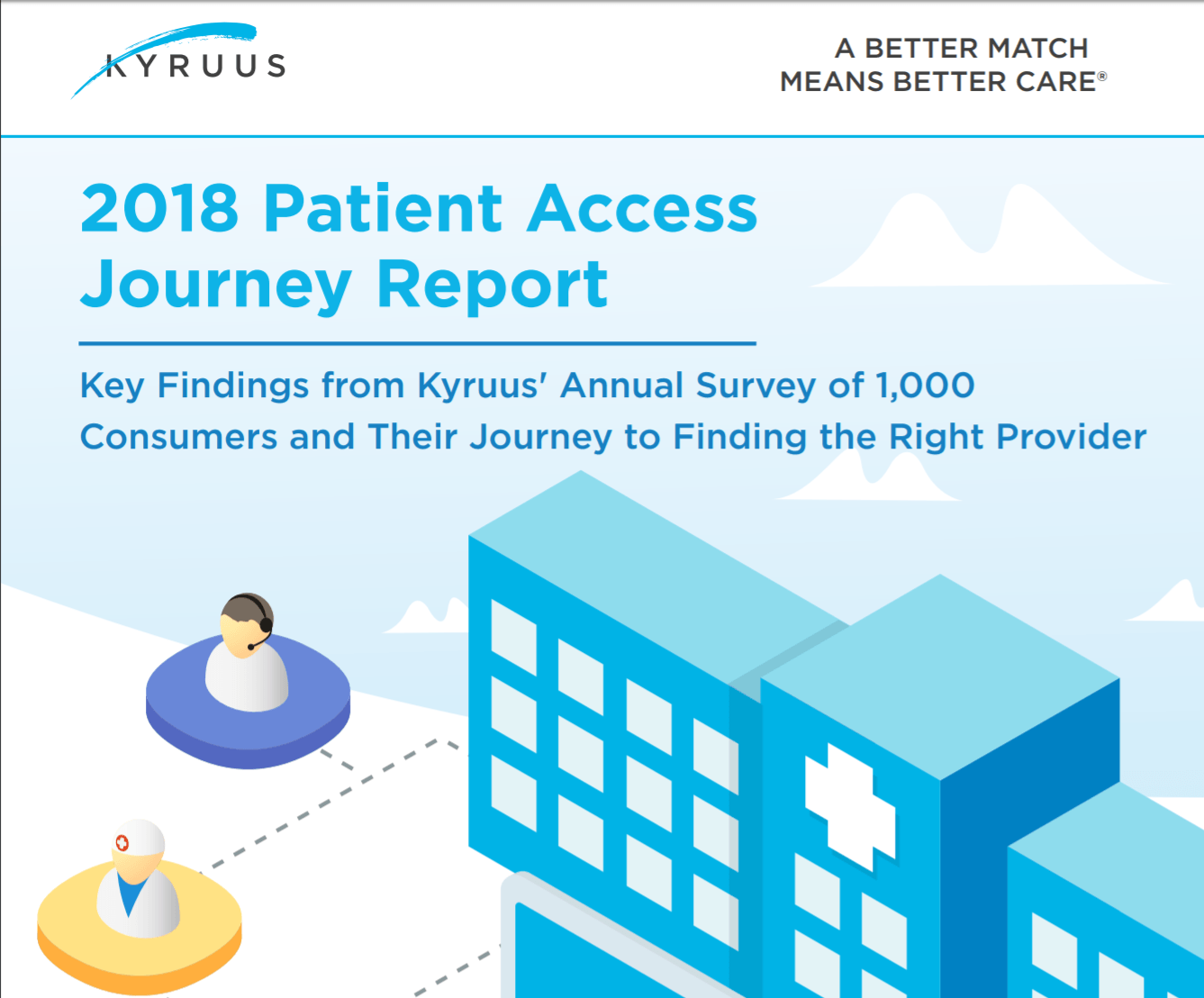
The annual survey from Kyruus Highlights patient access trends & opportunities for health systems to differentiate with a comprehensive and cohesive patient access strategy.
Within a relatively short number of years, patient experience has become a top priority for many healthcare organizations as consumerism continue to grow in healthcare. However, with so many players involved in delivering patient care, health systems are at a disadvantage relative to organizations in other industries when it comes to delivering a seamless customer journey.
Part of the challenge is addressing the varied ways patients access care: from looking online to calling in, to visiting clinics and hospitals, and receiving both in- and out-of-network referrals. Health systems need a firm understanding of each access channel in order to connect these disparate “front doors”. Hospitals and health systems that prioritize and successfully meet evolving consumer expectations stand to remain competitive, as suggested by findings in Kyruus’ new survey.
Survey Background/Overview
The second annual survey of 1,000 consumers ages 18-65+ conducted in partnership with Wakerfield Research takes an in-depth look at how consumers search, select and schedule appointments with doctors. The report, “2018 Patient Access Journey Report” indicates that while convenience is a growing priority for healthcare consumers, care quality, cost, and affiliation with a hospital or health system remain prominent factors in their care decisions. The findings also suggest that health systems can gain consumer loyalty by reducing inefficiencies in the scheduling process and creating a cohesive experience across all touchpoints along the customer journey.
Patient Access Trends/Key Findings
Six key patient access trends from the survey include:
1. Healthcare Consumers Want Self-Service Options for Obtaining Care
The 2018 survey results show that demand for self-service options continues to be a priority for today’s consumers. This is first evident in how consumers search for care.
2. Provider Availability and Location Top Criteria When Searching for Providers
Not surprisingly, appointment availability—both appointment wait times and flexible hours—and practice location is key for consumers searching for care. Availability, in particular, is uniformly important across generations: roughly ⅘ of all millennials, Gen Xers and baby boomers rated it extremely or very important.
3. Consumers Placing a Higher Significance on Quality in 2018
Not surprisingly, clinical expertise is the most important factor when selecting a provider, second only to whether the provider accepts the consumer’s insurance plan. 87% of respondents rated clinical expertise as extremely or very important, the same result as in 2017.
4. Interest in Quality Assessment Tools Growing
While the highest share of consumers seeking a PCP found a provider through independent research (34%), when asked about their preferred method, many stated: “a referral from a healthcare professional” (37%). In addition, this is the top source for consumers seeing specialists. However, millennials, Gen Xers, and baby boomers alike continue to perform due diligence. In fact, 91% of all respondents always or sometimes conduct additional research after receiving a referral from a healthcare provider.
5. Scheduling Barriers Hinder the Patient Experience
With so many consumers searching online for provider information (52%), but few currently preferring to book online (27%), there is both an opportunity for health systems to convert that demand better at the point of engagement and to drive more cohesion across key access points.
6. Consumers Are Looking for Branded Experiences
As care site options multiply, the fact that healthcare consumers are looking for a branded experience puts health systems at an advantage. In fact, most respondents stated that affiliation with a hospital or health system is extremely or very important (68%).
Health Systems’ Opportunity to Modernize Patient Access
Before health systems can delight their customers, they need to address the fractured provider search and scheduling experiences many consumers experience when trying to access care. With convenience a growing need for today’s healthcare consumers, health systems must also offer timely, self-service booking options for a growing digital population in order to acquire and retain patients effectively.
“Our annual patient access research shows that, above all else, health systems need to empower consumers with both targeted information and convenient options,” said Graham Gardner, CEO of Kyruus. “In the face of increasing choice from traditional and emerging sites of care, keeping pace will require health systems to offer hassle-free access to their providers and services. Those systems that can best understand, track, and deliver what consumers are seeking will be the best equipped to build patient loyalty and enable continuity of care.”
